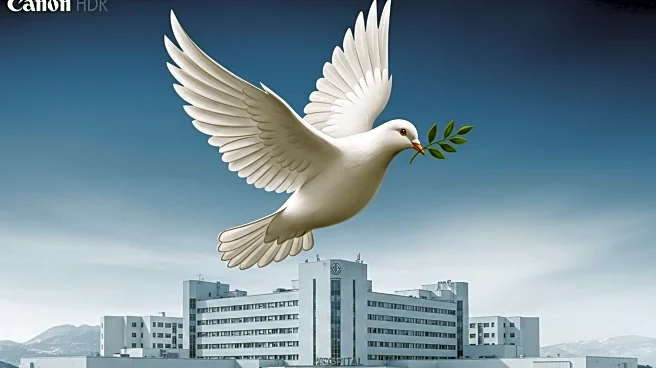What is the story about?
What's Happening?
Israeli military strikes on Nasser Hospital in southern Gaza have resulted in the deaths of at least 15 individuals, including four journalists. The Gaza Health Ministry reported that the strikes targeted the hospital's fourth floor, followed by a second strike as first responders and journalists were present. The deceased journalists include Hussam al-Masri from Reuters, Mohammed Salama from Al Jazeera, Mariam Abu Daqqa associated with multiple outlets including the Associated Press, and Moaz Abu Taha from NBC. Reuters confirmed the death of al-Masri and injuries to another contractor, Hatem Khaled. The incident has sparked further condemnation over the targeting of media personnel in Gaza.
Why It's Important?
The deaths of these journalists highlight the ongoing risks faced by media workers in conflict zones, particularly in Gaza. The incident raises concerns about the safety of journalists and the potential targeting of media personnel, which could hinder the documentation of events on the ground. The loss of these journalists is a significant blow to the media community, impacting the coverage of the conflict and the dissemination of information. The situation underscores the need for international attention and intervention to protect journalists and ensure their safety in conflict areas.
What's Next?
The international community, including media organizations and human rights groups, may increase pressure on Israel to address the safety of journalists in Gaza. Calls for investigations into the targeting of media personnel are likely to intensify. The U.S. government, influenced by Democratic senators, may seek further clarification from Israel regarding the strikes and the allegations against journalists. The ongoing conflict and media coverage will continue to shape public perception and diplomatic relations concerning the situation in Gaza.
Beyond the Headlines
The targeting of journalists in conflict zones raises ethical and legal questions about the freedom of the press and the protection of media workers. The incident may lead to discussions on international protocols and measures to safeguard journalists in war-torn regions. The broader implications include the potential chilling effect on media coverage, which could limit the flow of information and affect public awareness of the realities on the ground.















